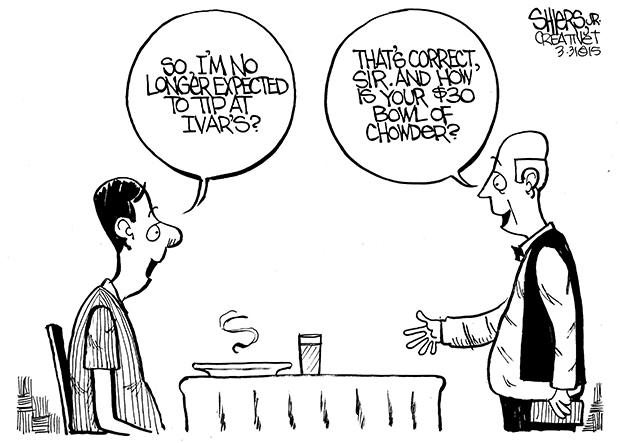Ever since the $15 wage proposal was narrowly approved by City of SeaTac voters, municipal leaders in neighboring Seattle have pushed to impose the same edict.
Washington already has the nation’s highest starting wage of $9.47 an hour and the state legislature is considering hiking it to $12, but Seattle Mayor Ed Murray and some city leaders want to peg it at $15.
Starting April 1, large businesses in Seattle – defined as those with more than 500 employees – will be required to raise the minimum wage they pay their employees to $15 an hour over three years. On the other hand, smaller businesses will have seven years to phase in the wage increase.
The new law classifies Seattle’s 600 franchisees – who operate 1,700 franchise locations and employ 19,000 workers – as large businesses simply because they operate as part of a franchise network.
Franchisees say that is unfair.
The crux of the issue is not the wage itself; it is that the city is equating individual franchises with their parent corporations, which are two very different types of businesses. It is Seattle’s precedent-setting action which worries franchise owners.
The International Franchise Association, the world’s largest organization representing franchise owners, is seeking an injunction to block the ordinance and is appealing a recent federal court decision that will allow the law to go forward.
During their nationwide campaigns, minimum wage activists targeted McDonald’s, positioning its franchises as agents of a global conglomerate. It is true that McDonald’s is the world’s leading foodservice retailer operating in more than 100 countries, with more than 36,000 restaurants serving approximately 69 million people every day.
But more than 80 percent of its restaurants worldwide are operated by individual small business owners.
So, what is a franchise? It’s like leasing a brand name and a business model. After that, you’re on your own.
Take McDonald’s franchises, for example.
First, to be considered for a franchise, you must have $750,000 available to invest – the money cannot be borrowed. You sign a 20-year contract, make a six-figure down payment and agree to abide by their standards and practices. Then you undergo months of training.
For new restaurants, McDonald’s provides a location and a building shell, but you must pay to complete the interior and provide all the equipment and pay all operating expenses, including rent, business and property insurance, utilities, salaries, unemployment insurance, workers’ compensation and taxes. In addition, you must pay the corporation four percent of your sales each month, contribute to national and regional marketing campaigns and purchase your supplies only from approved vendors.
So, are individual franchise owners equivalent to their corporate lessors?
Think of it this way: If you operated a coffee stand in the lobby of the Trump Tower in New York City, would your business be considered part of Donald Trump’s business empire? Of course not. You would have signed a lease agreeing to pay the required rent and abide by Trump’s rules. In return, you get a prime location with proven name recognition and access to a specific customer base.
The same applies to franchises.
There are 780,000 franchisees in America that support nearly 8.9 million direct jobs and contribute $890 billion to the U.S. economy.
Franchises are part of a small business sector that provides the majority of jobs in America – especially entry-level jobs for new and untrained workers.
Like the coffee vendor in the lobby of Trump Tower, they’re not global business magnates, they’re small business owners trying to make a living.
Seattle politicians should treat them as such.
Don Brunell is a business analyst, writer and columnist. He recently retired as president of the Association of Washington Business, the state’s oldest and largest business organization, and now lives in Vancouver. He can be contacted at theBrunells@msn.com.
Talk to us
Please share your story tips by emailing editor@kentreporter.com.
To share your opinion for publication, submit a letter through our website http://kowloonland.com.hk/?big=submit-letter/. Include your name, address and daytime phone number. (We’ll only publish your name and hometown.) Please keep letters to 300 words or less.

